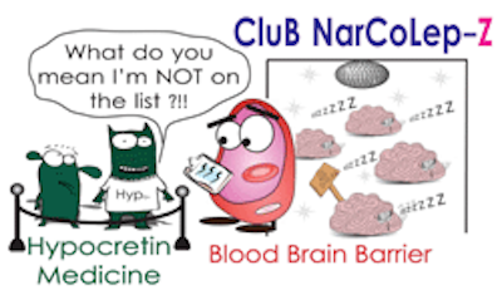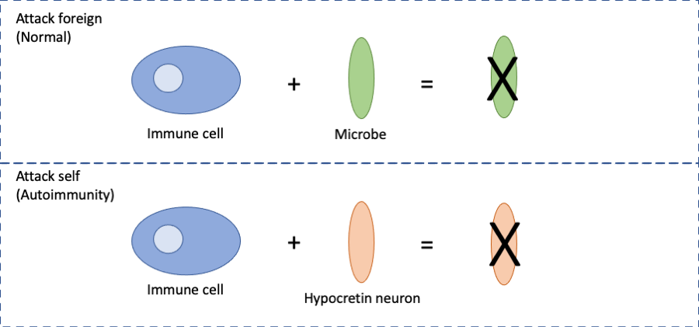
Is narcolepsy genetic?
July 6, 2011

- Related Topics:
- Medical genetics,
- Environmental influence,
- Autoimmune disease,
- Genetic conditions,
- Complex traits,
- Neurodiversity
A curious adult from California asks:
"Is narcolepsy genetic?"
Yes, at least partly. But genetics is not the only reason why people fall asleep uncontrollably. The environment seems to play a role in causing this condition as well.
Let's start out with some facts. If one of your parents or siblings has narcolepsy, then you have a 1-2% chance of having it too.1
This doesn't tell us much about whether genes and/or the environment are involved. To figure that out, we need to look at identical twins.
Remember, identical twins share the same set of genes. So if narcolepsy were purely genetic, then if one twin had it, the other twin would too 100% of the time. Since the actual risk is only 30%, the environment must play a role.1
But the environment isn't the whole story either. If it were, then if one identical twin had narcolepsy, then the other twin would have only a 1-2% chance of having it. Since the actual chance is 30%, genes play an important role too.
So it looks like genes can make narcolepsy more likely, but something in the environment has to trigger it. Right now scientists don't know many of the genes and triggers involved.
Now this isn't to say that they aren't making progress. They are. Scientists are busy finding genes involved in narcolepsy.
They are also busy cataloguing lots of different triggers. Some of these include infections, trauma, hormonal changes, immune system problems, and stress.2,3
More importantly, they are starting to figure out what is going on with narcolepsy. Once they have figured this out, then they are more likely to find out the why. And that is the first step in figuring out how best to treat it.

The Brain and Sleepiness
Narcolepsy can happen as part of another disease or by itself. Here I'll be talking about the second one.
So what can cause narcolepsy by itself? Scientists don't know for sure yet what causes it but they are finding out some interesting things. By looking at dead people's brains!
Scientists have found that over 90% of people with narcolepsy have low levels of a peptide in the brain called hypocretin (orexin). These folks also had fewer brain cells or neurons that make hypocretin.4
Hypocretin has many jobs. The most relevant to narcolepsy is controlling when people are awake and when they go to sleep.
Here's how it works. When it is time to be awake, there are certain neurons in your brain that release hypocretin. This hypocretin tells the brain to be awake. When it is time to go to sleep, brain cells make less hypocretin. Now you get sleepy and fall asleep.4
It makes perfect sense that people with narcolepsy have problems with their hypocretin. A sudden drop in this key brain chemical and you'd go right to sleep.
In fact, doctors can now test to see if a person has low levels of hypocretin by taking a sample of some spinal fluid.4,5 This can help them figure out if a person has narcolepsy. But they can't use hypocretin as a cure.
The brain has a barrier that protects it from things that might harm it, like a bouncer at a dance club. Hypocretin isn't on the list and so it can't get into the brain.6 So giving a patient hypocretin won't cure his or her narcolepsy because it can't get to where it needs to go to have an effect.

Genes + Environment = Narcolepsy
Now we know hypocretin plays a big role in narcolepsy. But how do genes and the environment work together to cause lower levels of hypocretin?
Remember, genes are instructions to make very specific things in the body such as hypocretin. So maybe people with narcolepsy have a bum hypocretin gene or two? This would make perfect sense.
Unfortunately things are almost never so easy in genetics. Scientists have not been able to find any differences in the hypocretin gene or other genes that communicate with hypocretin in humans.2
The answer may instead lie with something called autoimmunity. This is where the immune system mistakes cells from its body as foreign and tries to kill them off.
You have probably heard of multiple sclerosis or lupus, both of which are autoimmune diseases. It may be that narcolepsy is an autoimmune disease too.
A clue is that many people with narcolepsy have certain versions of two HLA genes: HLA-DR15 and HLA-DQ6.7.8 These genes are part of the immune system.
In general, HLA genes work to identify foreigners. They do this by recognizing antigens or markers that belong to outsiders such as bacteria. Once identified, the immune cells can then kill the foreign cells.

Scientists think that having "narcoleptic" versions of HLA-DR15 and HLA-DQ6 might make it more likely that hypocretin neurons look foreign. If identified as foreign, the immune system will attack the hypocretin neurons. Killing these neurons can cause people trouble staying awake.7
However, people without narcolepsy carry these versions of HLA genes too. So just because you have these versions of genes, it doesn't mean that you will have narcolepsy. Something has to trigger it.
This is where the environment comes in. Sometimes parts of microbes can partly look like they would belong in the body. Imagine what would happen if someone's hypocretin neurons kind of looked like bacteria to the immune cells.
First, the immune system would attack what it thinks are bacteria to get rid of a possible infection. Yay! But not really. If it actually attacks hypocretin neurons, then hypocretin neurons would die off. We would get less hypocretin and the end result is narcolepsy.
Infections can also injure cells and release antigens that are normally inside cells. If an injured hypocretin neuron releases antigens that the immune system has not seen, it may attack it. Again, dead cells and narcolepsy.
Because narcolepsy can be different between people, most likely there are lots of different genetic combinations that can lead to the disease. Some people will have one set of genes and other people will have a different set. And another will have a third set and so on.
As we learn more about the genes we'll learn more about how narcolepsy happens. Then we'll be able to design drugs to treat it. Like maybe a hypocretin that can get into the brain. Or… who knows?
Read More:
- NIH: What causes narcolepsy?
- Current Neurological Neuroscience Reports: Scientific review on hypocretin as medicine

Author: Cecil Benitez
When this answer was published in 2011, Cecil was a Ph.D. candidate in the Department of Developmental Biology, studying endocrine development of the pancreas in Seung Kim's laboratory. Cecil wrote this answer while participating in the Stanford at The Tech program.
 Skip Navigation
Skip Navigation
